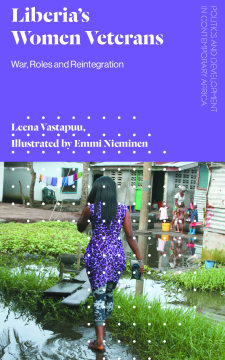
Additional Information
Book Details
Abstract
The Liberian civil wars of the 1990s and 2000s became notorious for their atrocities, and for the widespread use of child soldiers. Girls and young women accounted for up to 40 per cent of these soldiers, but their unique perspective and experiences have largely been excluded from accounts of the conflict.
In Liberia’s Women Veterans, Leena Vastapuu uses an innovative auto-photographic methodology to tell the story of two of Africa’s most brutal civil wars through the eyes of 133 female former soldiers. Incorporating their testimonies alongside a series of vivid illustrations by Emmi Nieminen, the book provides an in-depth account of these women’s experiences of trauma, stigma, and the challenges of reintegration into post-war society, as well as their hopes and aspirations for the future. Vastapuu argues that these women, too often been perceived merely as passive victims of the conflict, can in fact play an important role in post-war reconciliation and peace-building.
Overturning gendered perceptions of warfare and militarism, the book provides a unique take on humanitarian practices and post-conflict societies, making essential reading for policymakers as well as students and scholars across the humanities and social sciences.
Leena Vastapuu earned her doctoral degree from the University of Turku in 2017. She has written and researched widely on warfare and humanitarian issues, with a particular interest in the impact of conflict on women and gender roles. This is her first book.
Emmi Nieminen is a visual artist specialising in comics and graphic storytelling. Nieminen's work has been exhibited in group and solo exhibitions in Germany, Italy, Taiwan and Switzerland, and has been published in various anthologies in Finnish, English and German. Currently, Nieminen lives and works in Tampere, Finland, and is part of the Tampere Kunsthalle collective. She has been nominated twice for the Sarjakuva-Finlandia award.
‘Vastapuu and Nieminen have compelled me to think afresh about female veterans' post-war lives. Anyone curious about the complex lives of women during and after wars will be gripped by this eye-opening book.’
Cynthia Enloe, author of The Big Push: Exposing and Challenging the Persistence of Patriarchy
‘A beautiful meditation on the ways in which young female veterans in Liberia navigate life after war. Employing a set of unique methodologies, Liberia’s Women Veterans will become a key text in its field.’
Annick T.R. Wibben, University of San Francisco
‘Vastapuu makes a compelling case for gender to be mainstreamed in post-conflict reconstructive spaces. This book is among the very best to be written on youth, militarization, and coming of age.’
Mark A. Drumbl, Washington and Lee University
‘Fresh. Daring. Artistic. Humane. Its breakthrough methods and a willingness to operate outside the box result in fascinating accounts of women who fought in Liberia's wars.’
Christine Sylvester, University of Connecticut
‘Vastapuu not only offers a harrowing account of suffering as well as triumph over adversity, but also advances a truly innovative approach that makes this book highly relevant to a wide set of readers interested in questions of gender, violence and politics.’
Roland Bleiker, University of Queensland
Table of Contents
| Section Title | Page | Action | Price |
|---|---|---|---|
| Cover | Cover | ||
| Title Page\r | v | ||
| Copyright | vi | ||
| Dedication | vii | ||
| Contents | ix | ||
| Acknowledgements | x | ||
| Preface: Liberia at war | xiii | ||
| Introduction: Hell is the absolute lack of being heard | 1 | ||
| Challenging the taken-for-granted | 3 | ||
| Women war veterans as social rafters | 7 | ||
| Practicing feminist curiosity as a researcher | 10 | ||
| Worlding texts with the contrapuntal approach | 12 | ||
| Curious contrapuntalism as a theoretical backbone | 14 | ||
| Conclusion | 18 | ||
| 1: Auto-photographing rivers of insecurities\r | 21 | ||
| Visualizing the ‘pain of others’ | 22 | ||
| The auto-photographic research approach\r | 24 | ||
| From social navigation to social rafting | 27 | ||
| Amy, Teta and Priscilla as social rafters | 30 | ||
| Strengthening the rafts of survival | 34 | ||
| Street sisters and brothers as security providers | 38 | ||
| Conclusion | 40 | ||
| 2: Girl and women soldiers in Liberia’s civil wars\r | 43 | ||
| Joining the forces | 44 | ||
| Girls’ and women’s roles and duties in the ranks | 52 | ||
| Systematic inequalities inside the armed forces | 71 | ||
| Conclusion | 80 | ||
| 3: DDR: Disarmament, Disillusionment and Remarginalization\r | 85 | ||
| Exit battlefield, enter civilian life | 88 | ||
| Women veterans’ views on Liberian DDRR activities | 95 | ||
| Niti, nyaya and institutional justice | 104 | ||
| Conclusion | 113 | ||
| 4: Social rafting in post-war Liberia\r | 115 | ||
| The chicken that digs for food will not sleep hungry\r | 118 | ||
| Manoeuvring in the storms of life | 121 | ||
| Hustling is not stealing\r | 132 | ||
| Conclusion | 145 | ||
| 5: Let my children’s future be alright\r | 147 | ||
| I want to learn book | 148 | ||
| I would like to become a big business woman | 155 | ||
| Let me have a concrete house | 160 | ||
| Conclusion: ‘So I decided that life ahead of me will be better tomorrow’ | 163 | ||
| Conclusion | 169 | ||
| Warscapes as contrapuntal environments\r | 172 | ||
| Epilogue: ‘When I sing, I can forget about my problems’ | 175 | ||
| Notes | 179 | ||
| References | 187 | ||
| Index | 205 |
